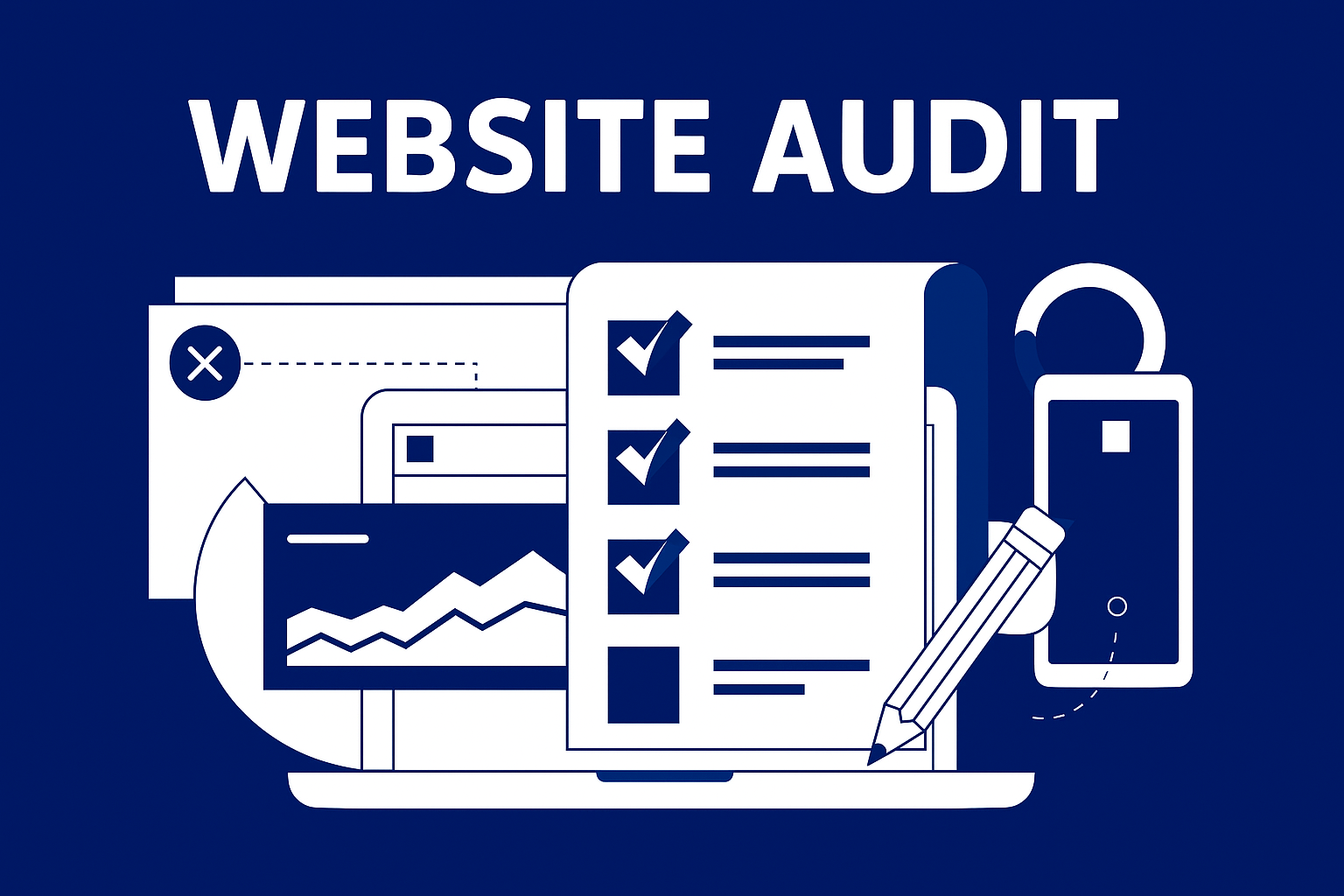SEO is no longer the same, and marketers need to understand it; accordingly, relevant updates need to be made to the SEO strategy. But every change and transformation starts with identifying the gaps in the existing strategy and introducing changes accordingly. Such gaps can be better identified by conducting a detailed SEO audit of your website.
Have you ever done your website’s SEO audit? Are you aware of the key aspects and areas that should be evaluated for a perfect SEO audit? Whether yes or no, you should go through this blog, as we will discuss a 15-point checklist that can be a perfect way to evaluate your website in 2025.
Before you go ahead and look for the associated factors to audit your website’s SEO, you need to understand why and how SEO is still relevant in 2025.
Types of SEO Audits to Be Performed
Before we move ahead with the SEO audit checklist, you must be aware of the diverse operational areas of SEO where the audit needs to be conducted. These can be:
Technical SEO
The “Technical SEO Audit” approach evaluates the technical aspects of the website, which ensures that the website is running smoothly and is accessible to users. It can include checking on the site speed, indexing, broken links, crawlability and more. More than 50% of the active websites lack these technical abilities. Hence, restricting their abilities to get ahead of the competition.
On-Page SEO
Another SEO audit approach that needs to be focused on is the “On-Page SEO Audit”. It focuses on every single visible aspect of your website. Such can be your website header, meta tags, keywords optimisation, internal linking, navigation, image/text optimisation and more. These on-page aspects help marketers ensure that their website is both user and Google Bot-friendly.
Mobile SEO
Globally, mobile users account for approximately 63% of the traffic; hence, it is essential to have a mobile-friendly website that can help you better serve your audiences. Such an audit ensures that the website is mobile responsive, has faster loading times and can keep audiences engaged.
Local SEO
Such an audit is important, as it indicates whether your business is searchable in a specific area or region. Conducting a local SEO Audit is significant as it helps optimise your brand for the location-specific keywords. It can further help boost brand visibility, attract relevant audiences and even build brand trust.
Content SEO
Content has been and will always be the king or the core aspect of every SEO strategy. Such includes checking on the content relevance for your website, placing the right keywords in the right position, and ensuring that a differentiation can be established through a quality content strategy.
SEO Audit Checklist for 2025
A perfect SEO audit checklist lists every key aspect that you need to supervise or monitor to ensure that your website and brand’s digital presence is optimised.
1. Check Website Indexing and Crawlability
You should check on the indexing and crawlability of your website. Conducting an audit can help you look for broken links, blocked resources (maybe through robots.txt), orphan pages, redirect chains and canonical tag issues. Such aspects can help you decide whether your website is easily searchable by Google bots. For such an audit, you can take the help of tools such as Google Core Web Vitals. Further can check for XML sitemap, robots.txt, site architecture and more.
2. Audit Website Site Speed and Performance
An important part of technical SEO is your website’s load speed. A faster-loading website gains better attention from users and keeps them engaged. As per the SEO experts, the ideal load speed of your website should be 2.5 seconds for desktop and 8.6 seconds for mobile. However, depending on the website’s purpose and target audience, such a time limit can vary. You can use tools such as Google Analytics and Page Speed Insights to check for such speed and performance. Such can help check on website resources, image size, and hosting infrastructure, and evaluate CDNs.
3. Auditing Website’s Linking Structure
A reason that your website has a low SEO score is that any dead or broken links appear as 404 errors. Such 404 links can confuse the Google bots as well as impact the user experience. Hence, conducting a linking structure audit can help you better understand how your pages across your website are connected. Also, any redirects or gaps, broken pages or irrelevant links can be identified and eliminated. Such an audit can be done with the help of tools such as SEMrush or any other prominent SEO tool.
4. Content Audit
Website content is one of the most important aspects to focus on when performing an SEO audit of your website. It involves checking whether your website has quality content or whether there is a need to further optimise it. The goal of such an audit is to check for duplicate content, grammar and flow, content relevance, keyword placements, and other relevant aspects that make content optimised for SEO.
You can conduct such a content audit by checking on your competitors, industry trends, and even through relevant tools that can suggest content ideas, including Ubersuggest, SEMrush and more. Also, at this stage, you need to ensure that your content aligns with the trends, which can be for voice search and AI snippets.
5. Mobile Responsiveness Audit
As mentioned, not every customer is present on or using desktops to make searches. Hence, your SEO audit should involve checking the mobile responsiveness of your website or app. It can help you better adjust the elements for user convenience. You can use Google’s Lighthouse and other relevant testing tools to evaluate a website’s mobile responsiveness. The audit helps check how the site appears on diverse devices, conduct page speed tests, optimise images and even test relevant pop-ups and input fields.
6. Testing User Experience (UX)
User Experience is one of the core elements to be focused on when conducting a detailed website SEO audit. Such a user experience is important as it plays an important role in boosting engagement and conversions on the website. UX is also one of the core reasons for cart abandonment for e-commerce websites. Conducting such a UX audit is a mix of elements such as site navigation, content quality, accessibility standards, mobile friendliness, clear CTAs and other aspects that can keep the audience engaged. Such an audit can be conducted by focusing on the user feedback, bounce rates, conversions, and mapping the user’s journey.
7. Audit Site Security Protocols
According to data, more than 30,000 new websites are being hacked daily, also approximately 46% of the websites are identified to be vulnerable to security threats. Hence, such an audit can help you better evaluate and understand the website’s security protocols, SSL certifications, authenticity of plugins, presence of two-factor authentication, third-party integrations, and other relevant measures. Such protocols can protect you from Google penalties and help improve the click-through rates.
8. Check For Social Media Integration On Your Site
You must have a social media presence to promote your brand products and services, and hence, integrating it with your website is of utmost importance. Such integration involves mentioning your website on your social media handles, as well as ensuring that your website content has the relevant CTAs and options to share on social media. These aspects can help you optimise your social media content for a better reach, as well as to improve brand searchability across platforms.
9. Audit Your GMB
More than 84% of the searches on Google are discovery searches, which indicates that a user is looking for a product or a service. Hence, such reflects the significance of having a well-optimised GMB profile for your business. Such a GMB profile is important for your local business, and any missing or incorrect information can impact your visibility and trust among the target audience. You can go to your GMB dashboard to look for any inaccuracies or improvements that need to be made to your profile.
10. Audit On-Page SEO Elements
To perform a complete SEO audit, you need to go through the relevant on-page elements that can impact your website’s overall SEO performance. It can be page titles, meta tags, internal linking, URL structuring and more. These on-page aspects have a significant impact on your website’s crawlability, visibility, and ranking. Such an audit can be done with the help of tools such as SEMrush, On-Page SEO Checker and more.
11. Optimise for Featured Snippets
A key trend to be focused on in SEO is featured snippets. Your website needs to be optimised for them. These snippets can be the “People Also Ask” section, general FAQs, AI overview, video snippets and more. Such an optimisation can be done by answering users’ doubts, adding content summaries, creating a table of contents, keeping content concise, using headers, and summarising all relevant information. To further look for areas or approaches through which you can optimise your website for such snippets, you can leverage tools such as SEMrush, Ahrefs or MOZ.
12. Eliminate Zombie Pages
Your website might have pages that had value or have contributed to your website traffic once but now are of no use. These pages are just contributing to an increase in the overall weight of your website. Hence, a considerable aspect is to find and eliminate these pages. The most common zombie pages can be empty category pages, irrelevant archive pages, old press releases, duplicate pages and any other content pages. These pages can impact your website’s authority and can even use up your website’s crawl budget.
13. Audit Your Keyword Positioning
Your SEO audit checklist should involve checking your website’s keyword positioning. You can use relevant tools to check for keywords your website is ranking for. Further, based on such, you can decide whether your targeting is relevant or not. Such can help you replan your keyword strategy and accordingly plan for relevant ranking targeting and positioning.
Conclusion
Hope the blog has helped you understand the relevant and key factors that you need to take care of while doing an SEO audit. But before you do that, you need to understand that SEO is no longer just about creating backlinks and keyword stuffing. It requires SEO experts to understand what specific aspects are relevant to your website and accordingly plan a strategy.
Apart from all, a considerable approach can be to reach out to the SEO experts at the leading SEO company in India, i.e., VerveOnlineMarketing. The SEO experts at VerveOnlineMarketing have years of experience delivering custom SEO solutions for the brands out there. Also, VerveOnlineMarketing is a full-fledged digital marketing company in India, offering every required digital solution for brands along with SEO. It includes SMO, PPC, Online Reputation Management and more. So what else are you looking for? Book Your Free Consultation Now.
FAQs
How Often Should I Perform An SEO Audit For My Website?
There is no set standard timing for when you should perform a comprehensive SEO audit of your website. But a healthy approach can be to do a thorough check every 3–6 months to have an overview of crucial metrics that are important for your website’s SEO.
What Is The Most Important Part Of A Website’s SEO Audit?
Every SEO related aspect, whether technical aspects, on-page SEO, mobile SEO or any other associated aspect, is equally significant in the SEO audit process. Simply focusing on some core areas might result in losing some unexplored ends that can impact your website’s overall SEO performance.
Should I Do an SEO Audit On My Own, or Should I Look For Professionals?
You should consult with experienced SEO professionals at a reputed SEO company in India to get a detailed and reliable SEO audit done for your website. The experts have access to real-time and advanced tools and resources, through which they can conduct a detailed SEO audit of your website.
What Can Competitor’s Website Audit Offer You?
Auditing your competitor’s website can help you set benchmarks and identify opportunities for improvement in your SEO strategies. Hence, you need to actively focus on these aspects and plan your SEO strategies accordingly.
Is Having An SEO Audit Checklist Necessary?
Having an SEO audit checklist can help you plan for relevant areas where you should focus on while conducting an SEO audit for your website. You can also take the help of experts at a reputed SEO company in India, who can help you identify relevant areas and strategies to optimise your SEO strategy.






